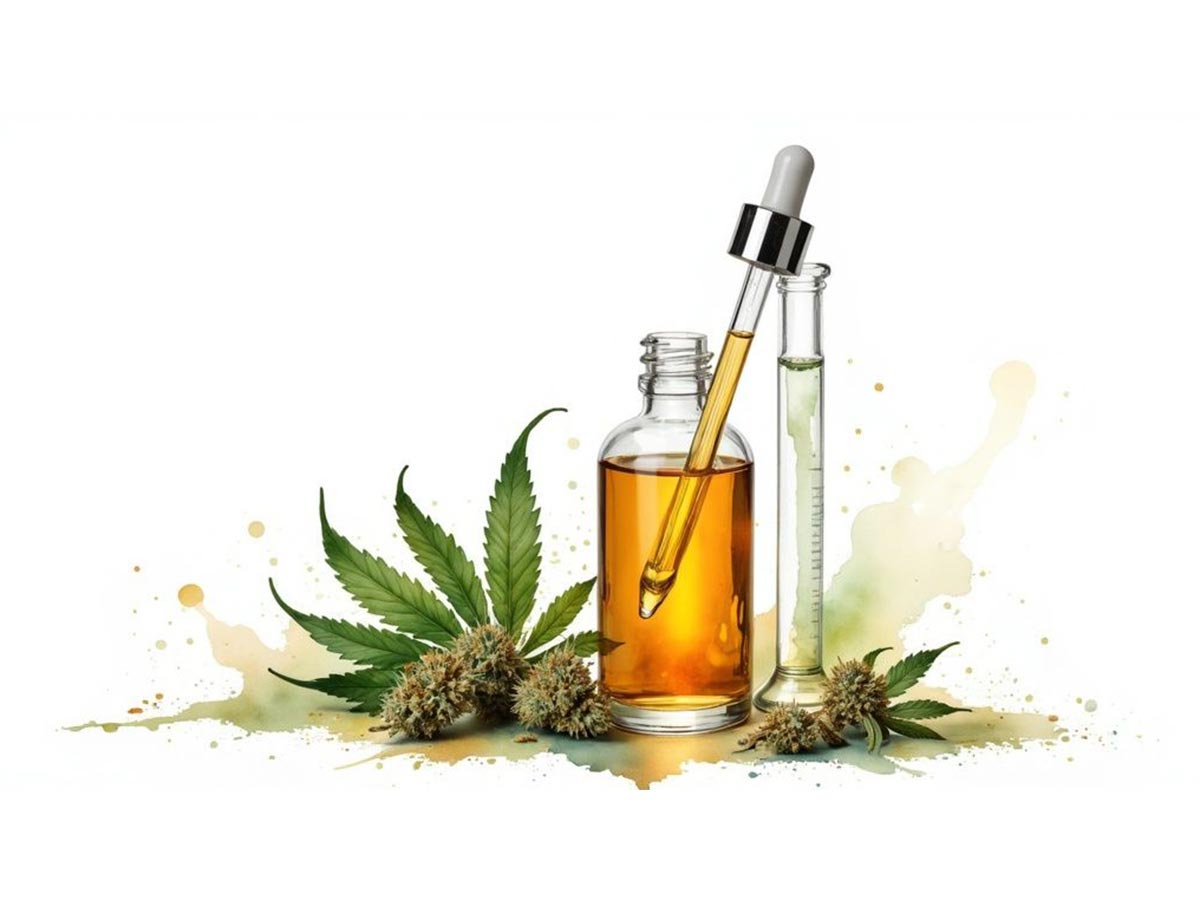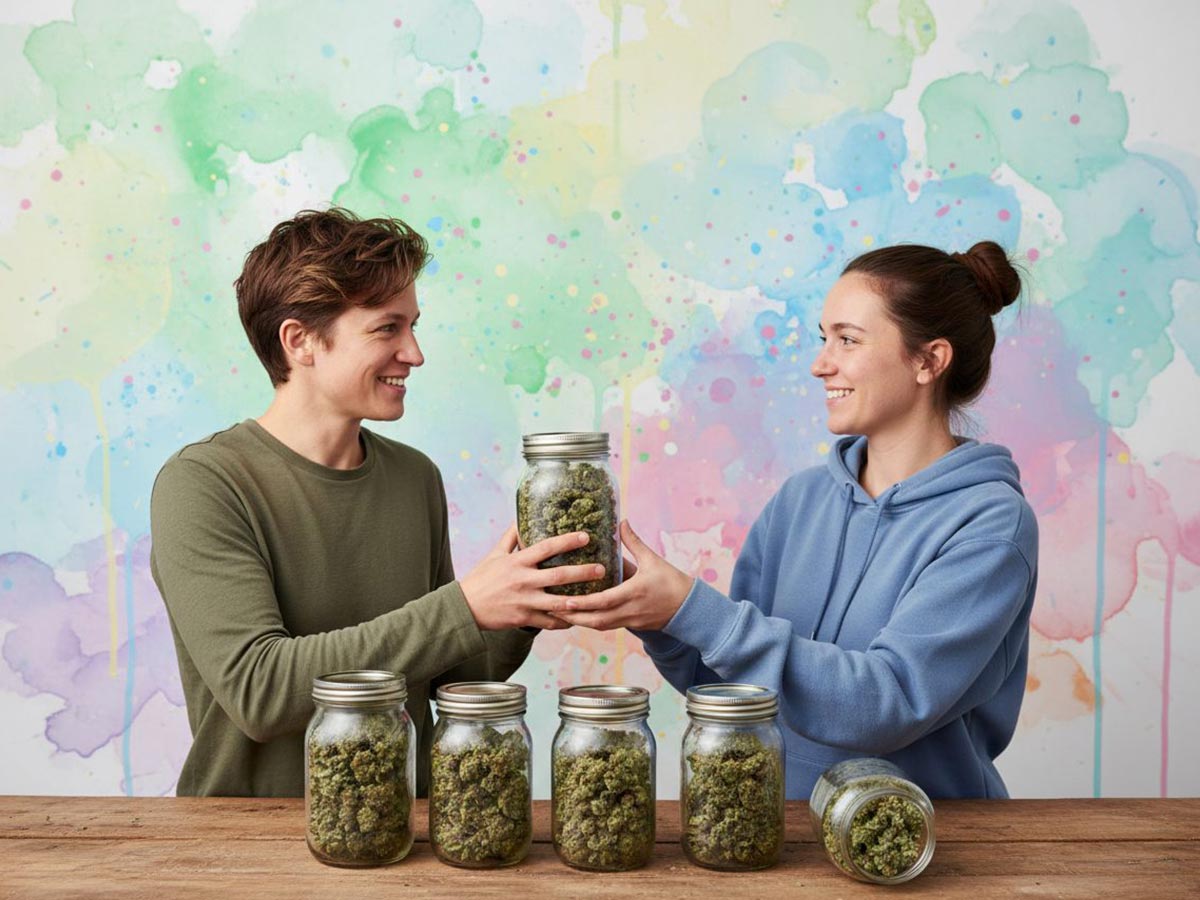Crafting a truly exceptional herbal tincture starts with one crucial choice: your solvent. For a potent, professional-grade result, you need high-proof, food-grade alcohol. We’re talking about spirits in the 151 to 190 proof range, which is 75.5% to 95% alcohol by volume. Why is this so critical? Because that high concentration is the secret weapon for unlocking the full spectrum of beneficial compounds that weaker alcohols simply can’t touch.
Why High-Proof Alcohol For Tinctures Is the Only Serious Choice
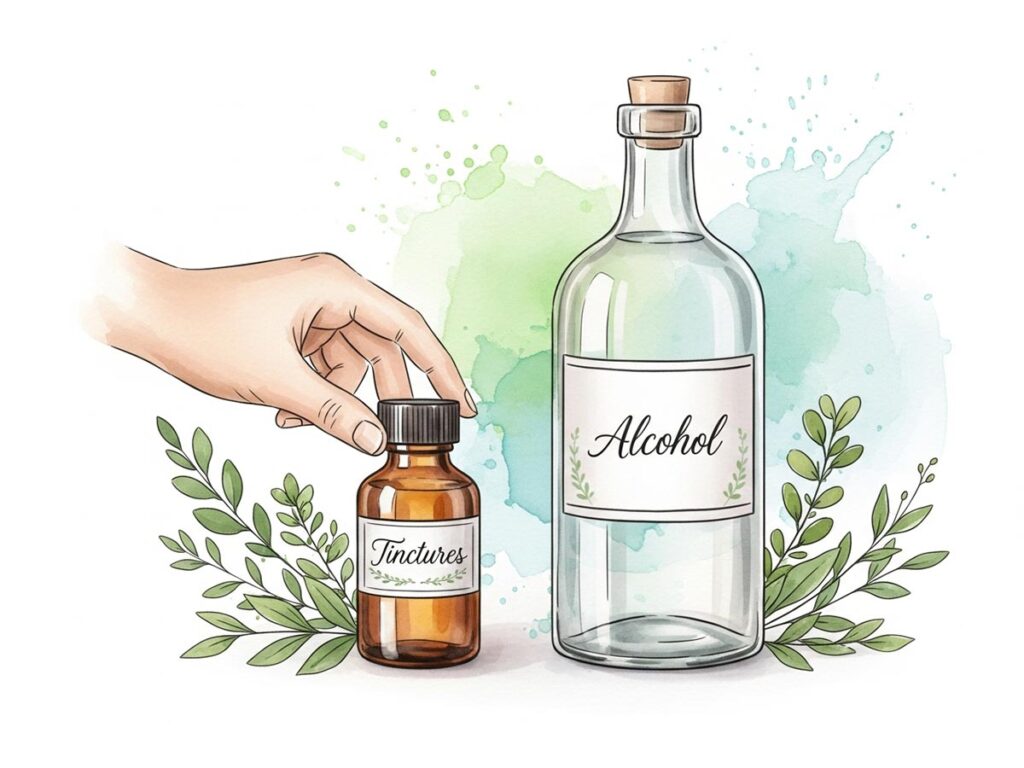
If you want a tincture that’s both powerful and shelf-stable, your choice of alcohol isn’t just a detail—it’s everything. Think of high-proof alcohol as your master key, performing two vital jobs simultaneously: it’s an unparalleled solvent and a foolproof preservative.
It works by unlocking a plant’s full medicinal potential. Many of the most valuable compounds in herbs—like resins, alkaloids, and essential oils—are oil-soluble and laugh at water. You need the chemical force of high-concentration ethanol to break down tough plant cell walls and pull those precious compounds into your solution.
Unlocking Potency: The Role of a Powerful Solvent
The final strength of your tincture is a direct result of how effectively your solvent extracts the plant’s active compounds. A standard 80-proof vodka might seem convenient, but at 60% water, it’s a weak tool for the job. That excess water gets in the way, leaving the most valuable, oil-soluble compounds locked inside the plant matter.
High-proof alcohol, by contrast, delivers a comprehensive, full-spectrum extraction. This means you capture a more complete and potent profile of the herb. It’s the difference between a weak herbal tea and a concentrated, powerful espresso shot.
“A tincture is a concentrated herbal extract made by soaking plant material in alcohol. The alcohol pulls the beneficial compounds… and preserves them for long-term use.”
Before we dive deeper, here’s a practical comparison of common tincture solvents. This will show you exactly why high-proof options are the superior choice for any serious extraction project.
Quick Guide to Tincture Solvents
| Alcohol Type | Typical Proof (ABV) | Extraction Power | Best For | Shelf Life |
|---|---|---|---|---|
| Grain Alcohol | 190 Proof (95%) | Excellent | Resins, dried herbs, full-spectrum extracts | 5+ years |
| High-Proof Rum | 151 Proof (75.5%) | Very Good | A wide range of herbs, adds flavor | 5+ years |
| Vodka | 80-100 Proof (40-50%) | Moderate | Water-soluble compounds, fresh herbs | 3-5 years |
| Brandy | 80 Proof (40%) | Moderate | Flavorful tinctures, water-soluble compounds | 3-5 years |
The takeaway is clear: the higher the proof, the more powerful the extraction and the longer the shelf life. This is precisely why spirits like Everclear (grain alcohol) are the gold standard for experienced herbalists.
Ensuring Long-Term Preservation and Safety
Beyond its extraction muscle, high-proof alcohol is an exceptional preservative. Its natural antimicrobial properties create an environment where mold, yeast, and bacteria cannot survive—a common failure point for preparations made with lower-proof spirits or water, which can spoil surprisingly fast.
According to the U.S. Department of Agriculture, alcohol is a highly effective preservative that dramatically extends a product’s shelf life. A well-made tincture using alcohol that’s at least 120 proof can remain potent and safe for five years or even longer when stored correctly. This stability ensures your hard work results in a reliable, high-quality product you can trust for years to come.
Understanding How Alcohol Proof Drives Extraction
To truly grasp why high-proof alcohol is non-negotiable for serious tincture makers, you need to understand “proof.” That number on the bottle is a direct measure of the alcohol-to-water ratio, and this ratio is the single most important factor determining your extraction’s success.
Think of it like brewing coffee. Lukewarm water will give you a weak, flat-tasting drink. But piping hot water unlocks a rich, complex array of flavors and aromatic oils. High-proof alcohol acts like that hot water, providing the chemical energy needed to pull out the complete profile of a plant’s valuable compounds.
The Dual-Solvent Power of Ethanol
What makes high-proof ethanol the undisputed champion of solvents is its unique ability to act as a dual solvent. This means it can dissolve both water-soluble compounds (like some pigments and vitamins) and oil-soluble compounds (the good stuff, like cannabinoids, terpenes, and resins).
Lower-proof spirits, being mostly water, are good at grabbing water-soluble components but fail miserably at extracting oils. Ethanol’s dual action is what allows you to capture the plant’s full spectrum, creating a potent and well-rounded extract. For a deeper dive into the specific compounds you’re targeting, our guide on understanding cannabis flower is an excellent resource. This is exactly why 190-proof spirits are the gold standard.
When we talk about high-proof alcohol, we’re talking about ethyl alcohol between 90% and 100% ABV. This is what you need for top-tier extraction and preservation. The purest stuff, 200 proof (100% ABV) food-grade ethanol, is the holy grail for its power to pull out literally everything—both water-soluble and fat-soluble compounds.
Why Higher Proof Equals Higher Potency
It’s a simple equation: the less water in your alcohol, the more pure ethanol is available to do the heavy lifting. A 190-proof spirit is 95% ethanol and only 5% water. This high concentration of ethanol aggressively breaks down the tough cell walls of dried plant material, ensuring that even the stickiest resins are fully dissolved into the liquid.
The result is a tincture that is more concentrated, more effective, and far more potent. When you choose high-proof alcohol, you’re making a conscious decision to get the absolute most out of every gram of your valuable herbs.
How to Choose the Right High-Proof Alcohol
Selecting the right high-proof alcohol for tinctures feels like a critical decision, because it is. Your solvent choice directly impacts your tincture’s final potency, flavor, and quality. But don’t worry, the choice is simpler than it seems.
Let’s walk through the best options so you can confidently select the perfect alcohol for your project. Your three most effective choices are food-grade ethanol, grain spirits like Everclear 190, and a high-proof vodka. Each has its own distinct advantages.
This quick visual breaks down the key differences between the top contenders.
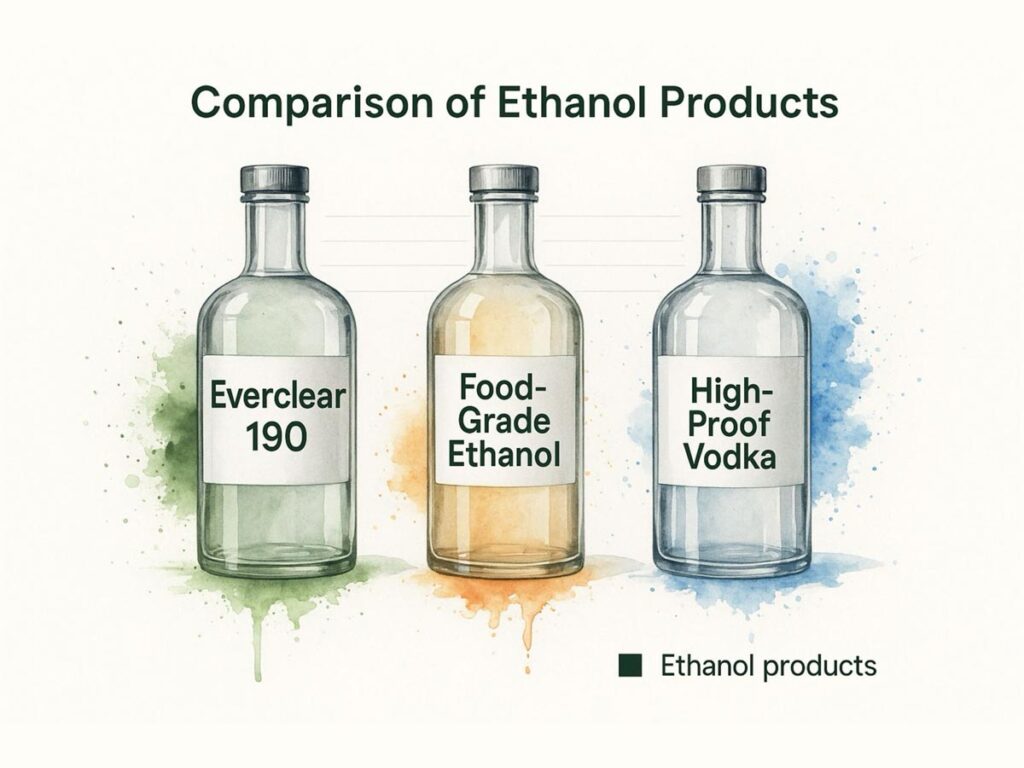
As you can see, the higher the proof, the better the extraction. That’s why food-grade ethanol and Everclear 190 are the heavy hitters here.
Comparing High-Proof Alcohols for Tincture Making
To understand the trade-offs, let’s compare the options side-by-side. This table breaks down everything you need to know about the most common spirits used for making tinctures at home.
| Alcohol Type | Proof Range (ABV) | Pros | Cons | Ideal For |
|---|---|---|---|---|
| Food-Grade Ethanol | 190-200 (95-100%) | Extremely pure and efficient extractor; neutral flavor. | Can be expensive; often requires online ordering. | Professional-grade, high-potency extracts where purity is paramount. |
| Everclear 190 | 190 (95%) | Powerful and effective for full-spectrum extraction. | Legally restricted or banned in many states. | Experienced crafters in areas where it’s legally available. |
| High-Proof Vodka | 80-100 (40-50%) | Widely available, affordable, and beginner-friendly. | Less potent extraction; shorter shelf life. | Beginners, experimenting with fresh herbs, or when stronger spirits are unavailable. |
Ultimately, the “best” alcohol is the one that fits your goals, budget, and local laws. For maximum potency, you can’t beat pure ethanol or Everclear, but vodka is a perfectly good starting point for learning the craft.
The Professional’s Choice: Food-Grade Ethanol
If your goal is to create the most potent and pure tinctures possible, then food-grade ethanol is your answer. Available at 190 proof (95% alcohol) or even 200 proof (100% alcohol), its near-total lack of water makes it an incredibly aggressive solvent. It will pull out the maximum amount of cannabinoids, terpenes, and other valuable compounds from your plant material.
Because it’s so clean, it imparts no flavor of its own, allowing the natural profile of your herb to shine through. You’ll likely need to order it online from a specialized supplier, but the superior results are well worth the effort for creating professional-quality extracts.
The Accessible Powerhouse: Everclear 190
Everclear 190 is another excellent choice and a long-time favorite among serious herbalists. At 190 proof (95% alcohol), its extraction capability is on par with pure ethanol, making it incredibly effective for creating potent, full-spectrum tinctures.
The main challenge with Everclear 190 is availability. Due to its extremely high alcohol content, many states have restricted or banned its sale. If you’re fortunate enough to live where it’s sold, it’s a phenomenal solvent for nearly any tincture project. Just be sure to check your local regulations before you go looking for it.
A Solid Starting Point: High-Proof Vodka
Are you new to tincture making, or do you live where stronger spirits are unavailable? A quality high-proof vodka is a fantastic place to start. Aim for a bottle that’s 100 proof (50% alcohol) if you can find it.
While not as potent as a 190-proof spirit, it absolutely gets the job done, especially for fresh herbs that already contain significant water. Vodka is affordable, widely available, and makes the process approachable for beginners. Just remember that its higher water content means it will be less effective at extracting oils and resins, resulting in a milder final product.
Crucial Safety Warning: Never, under any circumstances, use isopropyl (rubbing) alcohol or denatured alcohol for tinctures. These are not meant for human consumption and contain toxic additives. According to the National Capital Poison Center, ingesting even a small amount can be extremely dangerous. Always use food-grade ethyl alcohol—the kind designed for consumption. Your health depends on it.
Essential Safety Rules for Handling Strong Alcohol
Working with high-proof alcohol is perfectly safe when you treat it with respect. Think of it less like a beverage and more like a bottle of gasoline—both are highly flammable and demand careful handling. Your first priority is to create a safe workspace before you even open the bottle.
First and foremost: ventilation. Concentrated alcohol fumes can quickly accumulate in an enclosed space, creating a significant fire hazard. Simply opening a window or turning on an exhaust fan is a critical safety step.
Next, and this is non-negotiable, eliminate all potential ignition sources. This means no working near gas stoves with pilot lights, no open flames like candles, and no electronics that could create a spark. The vapors from high-proof alcohol for tinctures can travel surprisingly far and ignite instantly.
Creating a Safe Tincture Workspace
Here is a simple, practical checklist to run through every time you work with high-proof spirits:
- No Open Flames: This is the golden rule. Ensure there are absolutely no lit candles, gas stove burners, or any other open flames in the room.
- Good Ventilation: Open a window or use an exhaust fan. The goal is to keep fresh air circulating and prevent fumes from building up.
- Clear Your Area: Work on a clean, stable surface free of clutter. This dramatically reduces the risk of spills and other accidents.
To give you a visual, here’s the chemical structure of ethanol—the type of alcohol we’re dealing with.
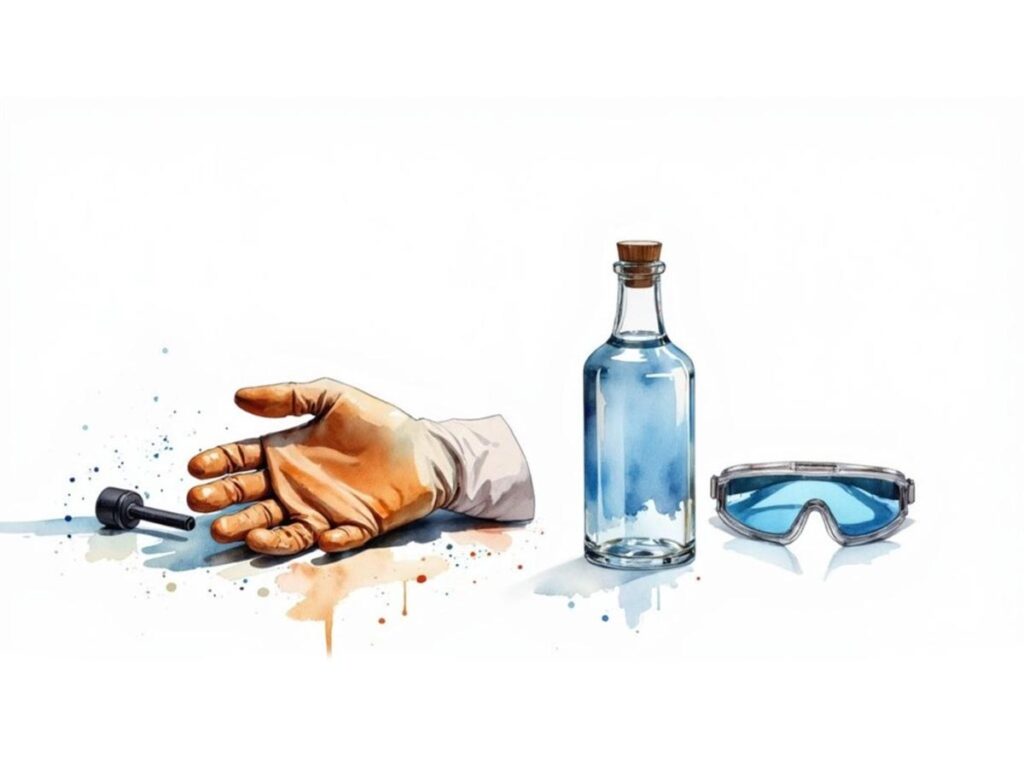
This simple molecule is what makes high-proof spirits such powerful solvents, but it’s also what makes them highly flammable.
Proper Storage and Labeling
Safety doesn’t end when your work is done; proper storage is equally critical. Always keep your high-proof alcohol in its original, tightly sealed glass bottle, stored away from heat sources and direct sunlight. The wrong container can degrade or allow the valuable alcohol to evaporate.
A secure, well-labeled storage system is your best defense against accidents. Never assume you’ll remember what’s in an unmarked bottle.
Finally, make it a habit to label everything clearly. This includes the alcohol itself, any works-in-progress, and your finished tinctures. Proper labeling prevents accidental misuse and ensures you always know exactly what you’re working with.
For more tips on keeping your materials organized and safe, check out our guide on the best cannabis storage containers.
How to Dilute High-Proof Alcohol Correctly
While 190-proof alcohol is the ultimate extraction tool, you won’t always need its full strength. In fact, many recipes—especially those using fresh herbs with high water content—call for a lower proof. Learning how to properly dilute your high-proof alcohol for tinctures gives you precise control over your craft.
This simple skill is a game-changer. It allows you to tailor your solvent to any plant material, ensuring you achieve predictable, professional-quality results every single time. It transforms your bottle of 190-proof spirit into a versatile, precision instrument.
The Dilution Formula Made Simple
You don’t need a background in chemistry to dilute alcohol perfectly. It all comes down to a simple formula: C1V1 = C2V2. It might look intimidating, but it’s incredibly easy to use.
Here’s what each part means:
- C1: The concentration (proof) of your starting alcohol, like 190-proof.
- V1: The volume of that starting alcohol you need to use. This is the number you’re solving for.
- C2: The final concentration (proof) you want to achieve, such as 120-proof.
- V2: The final total volume you want to end up with, for example, 500 ml.
A crucial pro-tip: always use distilled water for dilution. Tap water contains minerals and impurities that can interfere with your extraction and cloud your final tincture. Keep it pure.
A Practical Example: Turning 190-Proof into 120-Proof
Let’s put the formula into action. Imagine you want to make 500 ml of 120-proof alcohol using your bottle of 190-proof Everclear.
- Plug your numbers into the formula: (190) x (V1) = (120) x (500)
- Calculate the right side of the equation: 120 multiplied by 500 equals 60,000.
- Now, solve for V1: Divide 60,000 by 190. The result is 316 ml.
That’s it! You need to measure out 316 ml of your 190-proof alcohol.
To reach your target volume of 500 ml, you just need to add the right amount of distilled water. Subtract 316 from 500, which gives you 184. You’ll add 184 ml of distilled water to your 316 ml of alcohol, and you’re done.
Mastering this skill elevates your tincture making. Once you can precisely control your solvent’s strength, you can tackle any recipe with confidence. To see how this step fits into the complete process, explore our comprehensive guide on how to make cannabis tincture.
Common Questions About Tincture Alcohol
Even with a detailed guide, a few questions always pop up. Let’s tackle the most common ones about using high-proof alcohol for tinctures so you can proceed with absolute confidence.
Can I Use Regular Vodka from The Store?
You can, but it’s far from ideal. Standard 80-proof vodka is 60% water, which simply lacks the chemical power to perform a thorough extraction.
Water is ineffective at dissolving the oils and resins where most of a plant’s active compounds reside. This results in a weaker, less effective tincture with a shorter shelf life. For a potent, stable product you can rely on, you really need to use alcohol that is at least 151-proof.
Is It Safe to Consume Something Made with 190-Proof Alcohol?
Yes, absolutely—when used as intended. This is a common misconception. No one is drinking high-proof tinctures straight from the bottle.
A typical tincture dose is minuscule, usually just a few drops or a single dropper-full, which is often diluted in water, tea, or juice. In this context, the alcohol’s role is that of an efficient solvent and preservative, not a beverage.
Think of it this way: the final product is a highly concentrated plant extract, not a cocktail. A few drops are all you need, making the amount of alcohol you actually consume per dose totally safe and incredibly small.
Where Can I Buy High-Proof Alcohol for My Tinctures?
This can be challenging. The availability of 190-proof spirits like Everclear is determined by state law, and many states restrict their sale.
For serious tincture makers, the most reliable option is to purchase food-grade, non-denatured ethanol online from a culinary or laboratory supply company. It’s exceptionally pure, specifically designed for this purpose, and can often be shipped directly to your home without legal complications.
Why Can’t I Use Rubbing Alcohol for My Tinctures?
This is a critical, non-negotiable safety rule: never, ever use rubbing (isopropyl) alcohol for any product you plan to ingest. It is toxic and chemically different from the ethyl alcohol (ethanol) used in consumable spirits.
For your safety, stick exclusively to food-grade ethanol. This principle of using only food-safe ingredients is just as important when you make cannabis-infused butter as it is for tinctures.
At VT Strong, we believe that empowering you with the right knowledge helps you make safe, smart choices on your cannabis journey. Swing by our shop in Barre for top-notch local products and advice from a team that truly cares. Find your perfect match at https://vtstrongcannabis.com/store.

